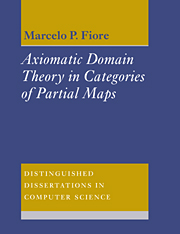
-
Select format
-
- Publisher:
- Cambridge University Press
- Publication date:
- November 2009
- August 1996
- ISBN:
- 9780511526565
- 9780521602778
- Dimensions:
- Weight & Pages:
- Dimensions:
- (247 x 174 mm)
- Weight & Pages:
- 0.46kg, 256 Pages
You may already have access via personal or institutional login- Series:
- Distinguished Dissertations in Computer Science (14)
Book description
Axiomatic categorical domain theory is crucial for understanding the meaning of programs and reasoning about them. This book is the first systematic account of the subject and studies mathematical structures suitable for modelling functional programming languages in an axiomatic (i.e. abstract) setting. In particular, the author develops theories of partiality and recursive types and applies them to the study of the metalanguage FPC; for example, enriched categorical models of the FPC are defined. Furthermore, FPC is considered as a programming language with a call-by-value operational semantics and a denotational semantics defined on top of a categorical model. To conclude, for an axiomatisation of absolute non-trivial domain-theoretic models of FPC, operational and denotational semantics are related by means of computational soundness and adequacy results. To make the book reasonably self-contained, the author includes an introduction to enriched category theory.
Reviews
‘ … the author succeeds in the difficult task of finding the right level of abstraction. Moreover, the exposition is very precise and technically outstanding.’
Daniele Turi Source: Science of Computer Programming (1998)
Contents
Metrics
Altmetric attention score
Full text views
Full text views help Loading metrics...
Loading metrics...
* Views captured on Cambridge Core between #date#. This data will be updated every 24 hours.
Usage data cannot currently be displayed.
Accessibility standard: Unknown
Why this information is here
This section outlines the accessibility features of this content - including support for screen readers, full keyboard navigation and high-contrast display options. This may not be relevant for you.
Accessibility Information
Accessibility compliance for the PDF of this book is currently unknown and may be updated in the future.


